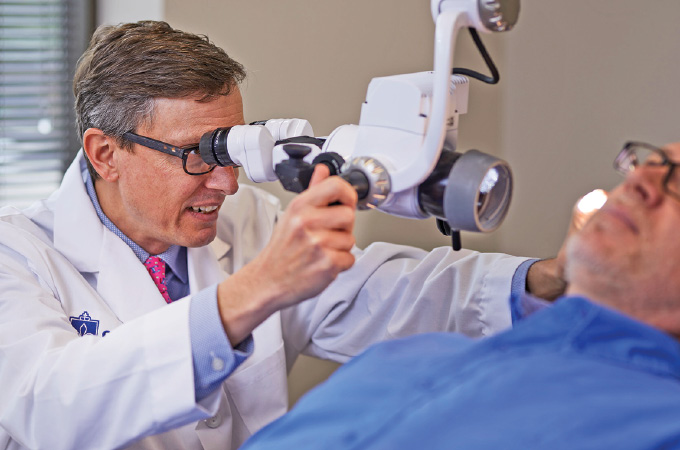Think about being unable to hear the world around you—the voices of loved ones, music, TV, the sounds of nature. It’s hard to imagine for most, but it’s a daily reality for many. Audiologist Dave Harris, Ph.D., says hearing loss can be a difficult challenge, but SLUCare practitioners offer modern solutions that fit patients’ unique needs. For David McLaurin, these services were life-changing.
McLaurin, 71, says he went to see Harris late last year because severe hearing loss was interfering with his daily activities. “I had the mumps as a child, and doctors originally said I might become completely deaf as a result,” he says. “I still have some ability to hear, but I had been missing a lot of what was happening around me. I had to ask people to speak slowly and repeat themselves, and it made communication very difficult. I would misunderstand what they said, and then I’d answer them wrong. And if there was any background noise, I couldn’t hear them at all. It was very frustrating.” McLaurin says on car trips with his wife, he had to ask her to stop at rest areas to talk because road noise made conversation impossible.
McLaurin says he now can appreciate simple things like the music of insects and tree frogs in his yard in southwestern Illinois. “I’m in awe of what I can hear,” he notes. “When I stepped outside on the first day of spring, everything was alive. I couldn’t wait to tell my wife about all of the wonderful sounds.”
Harris says hearing loss is a condition that doesn’t discriminate; it can happen at any age and for a variety of reasons. The most common cause is exposure to loud noise, either suddenly or over time. Bursts of sound like explosions and gunshots can be harmful, and so can sustained noise like loud music or the clamor of construction equipment. Age, dementia, some medications, and conditions like high blood pressure and diabetes also can play a role in hearing problems, Harris says.
“Around 2002, we started seeing a rise in the number of people who needed hearing aids,” he notes. “That’s when wireless headphone technology was evolving, and we think this was a big reason for the increase.” He says people who experience a ringing sensation in their ears—and those who regularly work in noisy environments or listen to loud music—should speak with a doctor before problems develop.
Harris points out that patients with gradual hearing loss may not become aware of it until professional testing is done. “Many people don’t realize there is a problem until they’ve experienced moderate to moderately severe loss,” he says. “When a new patient comes in, tests are performed to see if he or she can hear certain tones. We also look at middle ear function to see if the mechanical aspects of the auditory system are working. We decide whether the problem should be solved medically or surgically and consider a variety of options. Sometimes we send the patient to an otolaryngologist (ear, nose and throat doctor) for additional care.”
According to Harris, speech testing is another important part of the process. “If the patient has poor speech discrimination, hearing aids may not be suitable,” he explains. “They may just amplify sounds that the person can’t understand anyway.” He says in some cases of severe hearing loss, a cochlear implant may be the solution. The small electronic device bypasses damaged portions of the hearing system and stimulates the auditory nerve to help the patient recognize sounds.
Whatever methods are chosen to address hearing loss, Harris says SLUCare professionals monitor each patient’s progress carefully and make sure the treatment plan is effective over time. He works mainly with adults but says there also are effective screening tests and technologies for infants and children.
McLaurin says he wishes he had paid Harris a visit years ago, but he is grateful to be enjoying life now. “I had no idea how good I would feel after getting hearing aids,” he notes. “It’s so much better for your mood and self-esteem when you can hear everything. A whole different world opens up.”
SLUCare Physician Group offers complete care and advanced solutions for patients with hearing loss. SLUCare Audiology offices are at 3660 Vista Ave. and 555 N. New Ballas Road. Pictured on the section cover: SLUCare audiologists Dave Harris, Au.D., Ph.D.; Beth Suba, Au.D.; Amy Estill, Au.D.; Melissa Lowe, Au.D.; Julia Stelmach, Au.D. For more information, call 314.977.6362 or visit slucare.edu/hearing.
Cover design by Julie Streiler | Cover photos courtesy of SLUCare Physician Group
Pictured at top: Dr. Anthony Mikulec
Photos courtesy of SLUCare Physician Group
